

Menshevik. The Mensheviks (sometimes called Menshevists Russian: меньшевик[1][2]) were a faction of the Russian socialist movement that emerged in 1904 after a dispute in the Russian Social-Democratic Labour Party between Vladimir Lenin and Julius Martov, leading to the party splitting into two factions, one being the Mensheviks and the other being the Bolsheviks.
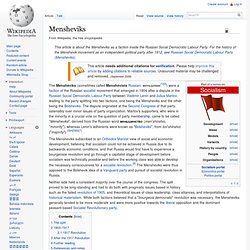
The dispute originated at the Second Congress of that party, ostensibly over minor issues of party organization. Martov's supporters, who were in the minority in a crucial vote on the question of party membership, came to be called "Mensheviks", derived from the Russian word меньшинство (men'shinstvo, "minority"), whereas Lenin's adherents were known as "Bolsheviks", from bol'shinstvo ("majority").[3][4][5][6][7] Bolshevik. The Bolsheviks were the majority faction in a crucial vote, hence their name.
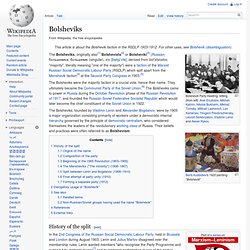
They ultimately became the Communist Party of the Soviet Union.[6] The Bolsheviks came to power in Russia during the October Revolution phase of the Russian Revolution of 1917, and founded the Russian Soviet Federative Socialist Republic which would later become the chief constituent of the Soviet Union in 1922. The Bolsheviks, founded by Vladimir Lenin and Alexander Bogdanov, were by 1905 a major organization consisting primarily of workers under a democratic internal hierarchy governed by the principle of democratic centralism, who considered themselves the leaders of the revolutionary working class of Russia.
Their beliefs and practices were often referred to as Bolshevism. Joseph Stalin. Joseph Stalin or Iosif Vissarionovich Stalin (Russian: Ио́сиф Виссарио́нович Ста́лин, pronounced [ˈjɵsʲɪf vʲɪsɐˈrʲɵnəvʲɪtɕ ˈstalʲɪn]; born Ioseb Besarionis Dze Jugashvili, Georgian: იოსებ ბესარიონის ძე ჯუღაშვილი, pronounced [iɔsɛb bɛsɑriɔnis dzɛ dʒuɣɑʃvili]; 18 December 1878[1] – 5 March 1953) was the leader of the Soviet Union from the mid-1920s until his death in 1953.
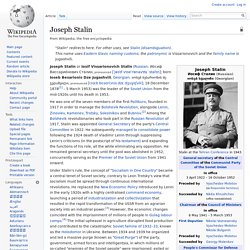
He was one of the seven members of the first Politburo, founded in 1917 in order to manage the Bolshevik Revolution, alongside Lenin, Zinoviev, Kamenev, Trotsky, Sokolnikov and Bubnov.[2] Among the Bolshevik revolutionaries who took part in the Russian Revolution of 1917, Stalin was appointed General Secretary of the party's Central Committee in 1922.
He subsequently managed to consolidate power following the 1924 death of Vladimir Lenin through suppressing Lenin's criticisms (in the postscript of his testament) and expanding the functions of his role, all the while eliminating any opposition. Early life Rise to power J. Leon Trotsky. Leon Trotsky[a] (Russian: Лев Дави́дович Тро́цкий; pronounced [ˈlʲef ˈtrot͡skʲɪj] ( ); born Lev Davidovich Bronshtein;[b] 7 November [O.S. 26 October] 1879 – 21 August 1940) was a Russian Marxist revolutionary and theorist, Soviet politician, and the founder and first leader of the Red Army.
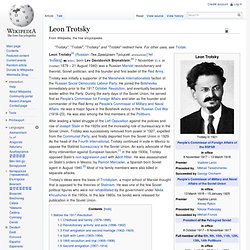
After leading a failed struggle of the Left Opposition against the policies and rise of Joseph Stalin in the 1920s and the increasing role of bureaucracy in the Soviet Union, Trotsky was successively removed from power in 1927, expelled from the Communist Party, and finally deported from the Soviet Union in 1929. As the head of the Fourth International, Trotsky continued in exile in Mexico to oppose the Stalinist bureaucracy in the Soviet Union. An early advocate of Red Army intervention against European fascism,[1] in the late 1930s, Trotsky opposed Stalin's non-aggression pact with Adolf Hitler. Before the 1917 Revolution Childhood and family (1879–1895) 2nd Congress of the Russian Social Democratic Labour Party. The 2nd Congress of the Russian Social Democratic Labour Party was held during July 30–August 23 (July 17–August 10, O.S.) 1903, starting in Brussels, Belgium (until August 6) and ending in London.
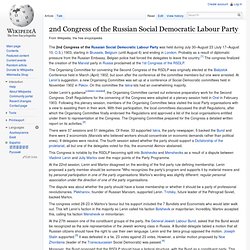
Probably as a result of diplomatic pressure from the Russian Embassy, Belgian police had forced the delegates to leave the country.[1] The congress finalized the creation of the Marxist party in Russia proclaimed at the 1st Congress of the RSDLP. The Organising Committee for convening the Second Congress of the RSDLP was originally elected at the Białystok Conference held in March (April) 1902, but soon after the conference all the committee members but one were arrested. At Lenin's suggestion, a new Organising Committee was set up at a conference of Social-Democratic committees held in November 1902 in Pskov. On this committee the Iskra-ists had an overwhelming majority.
There were 37 sessions and 51 delegates. A Central Committee was set up. References[edit] External links[edit] Russian Social Democratic Labour Party. This article deals with the political organisation established in 1883 and its history until the final split in 1912.
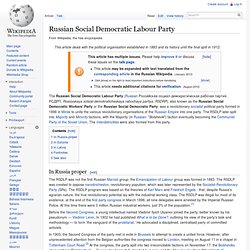
Vladimir Lenin. Vladimir Ilyich Ulyanov (Russian: Влади́мир Ильи́ч Улья́нов; IPA: [vlɐˈdʲimʲɪr ɪˈlʲitɕ ʊˈlʲanəf]), alias Lenin (/ˈlɛnɪn/;[2] Russian: Ле́нин; IPA: [ˈlʲenʲɪn]) (22 April [O.S. 10 April] 1870 – 21 January 1924) was a Russian communist revolutionary, politician and political theorist.
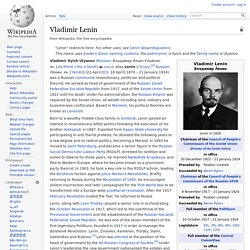
He served as head of government of the Russian Soviet Federative Socialist Republic from 1917, and of the Soviet Union from 1922 until his death. Under his administration, the Russian Empire was replaced by the Soviet Union; all wealth including land, industry and business was confiscated. Based in Marxism, his political theories are known as Leninism. Georgi Plekhanov. Plekhanov is the name of: Plekhanov may also refer to: Plekhanov Russian Economic University, public university in MoscowPlekhanov House, collection of the Russian National Library in St Petersburg14479 Plekhanov, main belt asteroid.
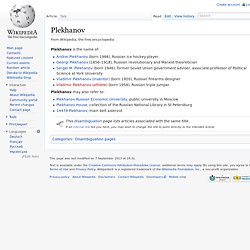
Communist Party of the Soviet Union. Nikita Khrushchev. October Revolution. The October Revolution (Russian: Октя́брьская револю́ция, tr.
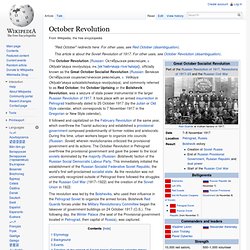
Oktyabr'skaya revolyutsiya, IPA: [ɐkˈtʲæbrʲskəjə rʲɪvɐˈlʲʉtsɨjə]), officially known as the Great October Socialist Revolution (Russian: Вели́кая Октя́брьская социалисти́ческая револю́ция, tr. Velikaya Oktyabr'skaya sotsialisticheskaya revolyutsiya), and commonly referred to as Red October, the October Uprising or the Bolshevik Revolution, was a seizure of state power instrumental in the larger Russian Revolution of 1917. It took place with an armed insurrection in Petrograd traditionally dated to 25 October 1917 (by the Julian or Old Style calendar, which corresponds to 7 November 1917 in the Gregorian or New Style calendar).
Etymology[edit]